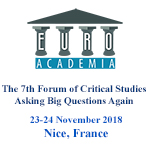Euroacademia Conferences
 Europe Inside-Out: Europe and Europeanness Exposed to Plural Observers (9th Edition) April 24 - 25, 2020
Europe Inside-Out: Europe and Europeanness Exposed to Plural Observers (9th Edition) April 24 - 25, 2020 Identities and Identifications: Politicized Uses of Collective Identities (9th Edition) June 12 - 13, 2020
Identities and Identifications: Politicized Uses of Collective Identities (9th Edition) June 12 - 13, 2020 8th Forum of Critical Studies: Asking Big Questions Again January 24 - 25, 2020
8th Forum of Critical Studies: Asking Big Questions Again January 24 - 25, 2020 Re-Inventing Eastern Europe (7th Edition) December 13 - 14, 2019
Re-Inventing Eastern Europe (7th Edition) December 13 - 14, 2019 The European Union and the Politicization of Europe (8th Edition) October 25 - 26, 2019
The European Union and the Politicization of Europe (8th Edition) October 25 - 26, 2019 Identities and Identifications: Politicized Uses of Collective Identities (8th Edition) June 28 - 29, 2019
Identities and Identifications: Politicized Uses of Collective Identities (8th Edition) June 28 - 29, 2019 The European Union and the Politicization of Europe (7th Edition) January 25 - 26, 2019
The European Union and the Politicization of Europe (7th Edition) January 25 - 26, 2019 7th Forum of Critical Studies: Asking Big Questions Again November 23 - 24, 2018
7th Forum of Critical Studies: Asking Big Questions Again November 23 - 24, 2018 Europe Inside-Out: Europe and Europeanness Exposed to Plural Observers (8th Edition) September 28 - 30, 2018
Europe Inside-Out: Europe and Europeanness Exposed to Plural Observers (8th Edition) September 28 - 30, 2018 Identities and Identifications: Politicized Uses of Collective Identities (7th Edition) June 14 - 15, 2018
Identities and Identifications: Politicized Uses of Collective Identities (7th Edition) June 14 - 15, 2018
Utopian Territories: Space and Place within Contemporary Installation
-
-

-
Presentation speakers
- Jennifer Hankin, Loughborough University, UK
- Download presentation
Abstract:
My current research focuses on contemporary installation and how particular participatory practices explore space in the creation of utopian worlds. How is utopia modelled and visually manifested within the gallery space? In Walton Kendell’s Art and Mimesis (1993), the role of the artwork as prop, is identified as a method of imaginative socialisation, play and a coordinative tool for group imaginings. In contemporary installation; landscapes of the imagination, risky constructions and bold spatial negotiations can be seen to function as a site of difference from our everyday experience of the world. Described by Nicholas Bourriaud in Relational Aesthetics (1998) as “micro utopias” (Bourriaud, 1998, p.31), artists can explore installation as exotic worlds which function as if governed by alternate principles. With a focus on Olafur Eliasson, Carsten Höller my research focuses firstly on localised versions of space and community, and then, with reference to the writings of Jean Rousseau’s Discourse on the Origin of Inequality (1754) the implications of politics and territory are argued to be a key determiner of social and egalitarian interactions. How has the globalised world affected utopian ideas which are increasingly further away from a singular utopian nation? This paper aims to examine the inner workings of installation as a group territory and how we may explore and locate a contemporary version of utopia within the spatial boundaries of the gallery. In what ways do artists utilise space and object to encourage the experiencer to act as a key participant and test out new and imaginative possibilities? Finally, what futures are suggested in contemporary practices for the globalised utopian and the potentially humane world of installation?
References
Bourriaud, N. (1998) Relational Aesthetics. Paris: Les Presses du Reel.
Rousseau, J.-J. (2004) Discourse on the Origin of Inequality. Mineola, New York: Dover Publications Inc.
Walton, K. L. (1993) Mimesis and Make Belive: On the Foundations of the Representational Arts. United States: Harvard University Press. -
Related Presentations

Cultural Diplomacy and Global Exhibitions of Modern Arab Art from the Barjeel Art Foundation
- Patrick Kane













